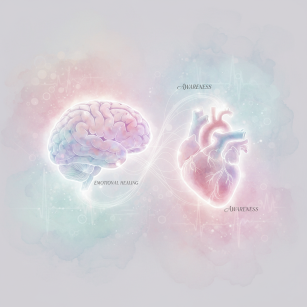The Illusion of Control Without Tracking
For a long time, I believed I had control over my finances simply because I thought about them often. I would make mental notes of what I spent, tell myself I’d save more next month, and even set small goals like, “I’ll invest more when things settle.” But deep down, I was mostly guessing. There was a subtle comfort in believing that awareness alone was enough that if I cared enough about money, I must be handling it well.
The truth was different. Awareness is not the same as clarity.
And clarity cannot exist without something tangible to hold it a system, a structure, a dashboard.

Many of us live with this quiet illusion of control. We scroll through our banking apps, pay our bills, maybe set aside some savings, and feel we are on top of things. But underneath it all, there’s often confusion: Where exactly is my money going? Why does my account feel lighter at the end of the month than I expected? Why do I still feel anxious about money even when I’m earning well?
That anxiety doesn’t come from a lack of money. It comes from a lack of visibility.
Our brains crave patterns and certainty. The prefrontal cortex the rational part of our mind loves clarity, numbers, and plans. But when things are vague, another part of our brain steps in: the amygdala, the region that processes fear and uncertainty. When our finances are unclear, it sends constant low-level stress signals through our nervous system. We may not notice it consciously, but it quietly drains our energy, reducing focus, sleep quality, and confidence.
That’s why sometimes, even when you’re doing “okay,” you can feel financially unsafe. Your brain is not seeing the full picture. It’s trying to protect you from an invisible threat uncertainty.
The illusion of control feels comforting in the short term because it spares us from facing the numbers. But over time, that illusion costs us peace.
Why We Avoid Looking Closely at Money
It’s easy to think the reason we don’t track money properly is laziness or disorganization. Psychologically, however, it’s more complex. Avoidance is rarely just about discipline; it’s an emotional defense.
Money holds symbolic meaning in our lives security, freedom, success, self-worth. When we open a spreadsheet or look closely at our finances, we aren’t just seeing numbers. We’re seeing a reflection of our choices, fears, and sometimes even our regrets.

Neuroscientists call this “cognitive dissonance” the mental discomfort that arises when reality doesn’t match our self-image. For example, if I see myself as responsible but my spending habits show impulsivity, my brain feels a subtle inner conflict. To avoid that discomfort, I might just not look too closely. I’ll tell myself, “I already know roughly where things stand.” That’s the brain’s way of protecting the ego from momentary pain.
Here’s what I eventually learned: avoiding that discomfort doesn’t protect us. It just delays the peace that comes from facing the truth.
It’s a bit like standing in a dark room trying to guess where the furniture is. You’ll bump into things and feel anxious moving around. The moment you turn on the light no matter how messy the room looks you suddenly feel more in control. You can see, decide, and act.
That’s what tracking does for your mind. It switches on the light.
The Emotional Cost of Financial Uncertainty
There’s a quiet emotional toll that comes from not truly knowing where your money stands. You might notice it in small ways checking your balance too often, feeling guilty about small purchases, or hesitating to spend on things that actually matter to you because, “what if something goes wrong later?”
Financial uncertainty keeps the nervous system slightly on edge. It creates micro doses of cortisol the stress hormone every time you think about money. This keeps you in a subtle “fight or flight” mode, making it harder to think creatively, plan long term, or even enjoy what you have.
The paradox is that the more we avoid structure, the more trapped we feel.
Structure is not a prison; it’s safety.

When you know exactly what’s coming in, what’s going out, and what’s growing, your brain can finally relax. You stop fighting invisible battles and start living with gentle awareness. That’s when your dreams stop being vague wishes and start turning into plans.
This is where the concept of a dashboard mindset begins to take root.
But before we talk about dashboards, I want to share what I discovered about the way our brains form money habits understanding this is key to building any financial system that actually works.
How the Brain Builds (and Breaks) Financial Habits
Every money decision we make passes through a delicate dance between two parts of the brain: the limbic system and the prefrontal cortex.
The limbic system is fast, emotional, and reward-driven. It loves instant gratification. That’s why we get a dopamine hit when we buy something, even if we don’t really need it. It’s the same chemical that makes us check notifications or crave sweets after a stressful day. The brain links spending with relief and pleasure not because the purchase is rational, but because it soothes emotional tension.
The prefrontal cortex, on the other hand, is slow and logical. It plans, prioritizes, and makes long-term decisions. But it tires easily. Every time you make a decision what to eat, what to wear, how to reply to an email you use a bit of mental energy called decision-making bandwidth. By the time you reach your evening, that bandwidth is nearly gone. That’s when impulse spending thrives.

So when we try to “control” our finances using willpower alone, we’re setting ourselves up for failure. Willpower is not a system. It’s a temporary state of mental energy.
This is why people who track their finances seem more disciplined. What really happens is this: once they’ve built a system, the system makes the decisions for them.
Automation and tracking free the prefrontal cortex from small repetitive decisions, reducing decision fatigue. That’s how you gain consistency not through force, but through design.
This shift, from self-control to system-control, is one of the most powerful psychological upgrades anyone can make in their financial life.
Facing the Truth Gently
When I first started tracking my expenses seriously, I remember how uncomfortable it was. The numbers didn’t lie, and they showed things I had conveniently ignored little leaks, emotional splurges, unnecessary subscriptions.
Instead of judging myself, I decided to stay curious. That small shift in attitude changed everything.
Curiosity replaces shame with learning. It tells the brain: “This isn’t a punishment; this is discovery.”

When we track from a place of curiosity, the emotional resistance melts away.
Each number becomes a story. Each expense becomes feedback. Slowly, your awareness expands.
That’s when clarity becomes healing. You realize it was never about controlling money it was about understanding yourself.
Building a Financial System That Feels Human
When I first started creating a structure for my finances, I wanted it to be perfect. I imagined color-coded spreadsheets, automated trackers, charts that updated in real time. I spent hours trying to design the “best” system before even using it.
Then I realized something deeper. I wasn’t looking for a spreadsheet. I was looking for safety.
That’s the truth behind most financial systems they aren’t just tools. They are ways we tell our nervous system: It’s okay. You’re safe. You’re in charge now.

A good system doesn’t overwhelm you with numbers. It shows you only what matters. It lets you see your reality clearly enough that you can make gentle adjustments without fear.
It’s not meant to be perfect. It’s meant to be alive.
What a Real Financial System Looks Like
A good system is less about complexity and more about consistency. It should feel like a rhythm you can live with not a routine that exhausts you.
Here’s what that rhythm often includes:
- One clear place to track reality Whether it’s a spreadsheet, an app, or a notebook, have one central home for your numbers. When information is scattered, your mind stays scattered too.
- A snapshot of where you stand This can be as simple as: income, fixed expenses, flexible expenses, savings, and investments. You don’t need hundreds of categories. You just need a mirror that reflects truth without judgment.
- Gentle review moments Once a week or twice a month, sit with your system quietly. Light a candle, play soft music, and make it an act of self-care rather than punishment. This is your time to reconnect with your life story told in numbers.
- One small rule that protects your future It could be as simple as: “Save before you spend,” or “Never invest in what I don’t understand.” The key is to anchor your system with a principle that feels like home.
A system is not about making money look pretty. It’s about turning confusion into conversation.
When you see where your money goes, you start noticing where your energy goes. You start understanding what truly matters to you not what advertisements or social pressure tell you.
The Psychology of Structure and Safety
Our brains love predictability because it reduces uncertainty the very thing that triggers our fear circuits. Neuroscientists call this the “safety loop.” When your mind sees patterns, it releases serotonin, a neurotransmitter that calms the nervous system.
That’s why people who budget or track their finances tend to feel lighter even if their numbers haven’t changed yet. The calm doesn’t come from having more money. It comes from seeing your money.

When you track, you activate the prefrontal cortex the rational, planning part of your brain. This area communicates with the amygdala, reducing the intensity of fear signals. In short, numbers bring peace not because they change the future, but because they give your mind something solid to hold on to.
This is also why financial clutter causes stress. When we have too many accounts, too many cards, or too many apps, our cognitive load increases. The brain treats that chaos like open browser tabs it quietly drains mental energy even when we aren’t actively thinking about it.
A clean, minimal system is a gift to your mind. It helps your thoughts breathe.
From Tracking to Transformation
At first, your system will feel mechanical numbers, inputs, balances. But something beautiful happens when you stay consistent. Slowly, those numbers begin to reflect your values.
You see patterns how often you spend on comfort versus curiosity, how much you save when you’re calm versus anxious, how your emotional state shifts your financial behavior.
This is where emotional awareness enters the picture.

Every expense tells a story about how you were feeling. Some purchases come from joy, others from exhaustion or loneliness. When you track those patterns with compassion, you stop judging yourself and start healing.
You begin to separate emotional needs from financial actions. Instead of saying, “I need to stop spending so much,” you begin to ask, “What was I really trying to feel when I bought that?”
That question is not financial. It’s therapeutic.
The Hidden Link Between Emotions and Money Behavior
Money is emotional energy in material form. It’s how we exchange trust, value, and comfort. When emotions go unacknowledged, they often find their outlet through spending or hoarding.

Psychologists describe two main patterns of financial coping: escape and control.
- Escape spending happens when we use money to change our emotional state. For instance, shopping after a stressful day activates dopamine, temporarily lifting our mood. But the relief fades quickly, leaving guilt behind.
- Control spending happens when we withhold money to feel safe. We cling to every rupee or dollar, fearing loss. This behavior is driven by scarcity mindset the subconscious belief that there will never be enough.
Both are forms of emotional compensation. They arise when our internal state is disconnected from external structure.
When you have a clear dashboard a place where you can see your reality these extremes soften. You no longer need to control or escape. You can understand.
Understanding heals what control cannot.
The Dashboard Mindset Clarity Without Obsession
A financial dashboard is not just a tool. It’s a philosophy. It means choosing visibility over vagueness, balance over avoidance, and curiosity over fear.
When you adopt the dashboard mindset, you stop treating money like a monster in the closet and start treating it like a garden. You water it, prune it, check its soil, but you don’t hover over it every hour.
The goal is clarity, not control.
Your dashboard should make you feel at peace, not pressured. It should remind you of your direction, not your shortcomings.

Here’s how I see it:
- Clarity is calm. When you know where you stand, your brain relaxes.
- Visibility is power. When you can see your inflows and outflows, you can make aligned choices.
- Consistency builds trust. When you revisit your system regularly, your nervous system learns that money is safe to look at.
This is not financial discipline. This is emotional alignment.
Weaving in the Vision A System That Feels Like Home
Over time, I began imagining how beautiful it would be if everyone could have a simple, soothing dashboard that reflected not just numbers but feelings.
A space where money tracking didn’t feel like a chore but like a gentle conversation with yourself.
Where each expense category carried emotional meaning not just “Food” or “Shopping,” but “Nourishment,” “Learning,” “Comfort,” “Growth.”
Money, at its best, is not a spreadsheet. It’s a mirror of our inner world.
That’s why I started working on a small tool something that could bring this peace to more people. A dashboard that feels less like accounting and more like therapy. Something that guides, not scolds.
It’s still growing quietly in the background, shaped by every realization I’ve had on this journey. I think that’s how all good systems are born not out of greed, but out of love.
Living With Clarity
There was a time when I used to think financial peace meant having more income, more investments, more stability. With time, I’ve realized that peace rarely comes from accumulation. It comes from alignment.
When your system reflects your truth, when you know what’s flowing in and what’s flowing out, when every number feels like part of a story you understand that’s peace.
It’s not about chasing perfection or wealth for its own sake. It’s about creating a life that feels coherent, where your actions match your intentions.
When you reach that point, something magical happens inside you. The nervous system relaxes, the mind stops running mental simulations of “what if,” and your body feels safe to dream again.
You no longer live in reaction to your bank balance. You live in conversation with it.
This is financial freedom in its most human form not just the ability to buy things, but the ability to breathe fully without the weight of financial confusion.
The Healing Power of a Dashboard
When I say your financial system needs a dashboard, I don’t just mean a tool. I mean a lens a way of looking at your life with kindness, curiosity, and clarity.
The dashboard is not only about money. It’s about awareness.
When you start tracking your finances consciously, you start tracking your inner life too. You begin noticing the emotional triggers behind every purchase, the fears behind every delay, the joy behind every act of generosity.
Your financial system becomes a spiritual mirror. It reveals what you value, what you avoid, and what you’re ready to heal.

Neuroscience tells us that awareness itself changes the brain. The act of observing your own behavior activates the anterior cingulate cortex, which improves emotional regulation. Every time you sit with your dashboard, you’re not just managing your money you’re rewiring your brain toward calm and clarity.
This is why people who adopt mindful financial systems often experience healing in other parts of their lives too. They sleep better. They argue less about money. They make decisions with confidence instead of fear.
When one area of life becomes transparent, it teaches your mind how to find clarity everywhere else.
The Gentle Art of Letting Go of Control
Control feels powerful but it’s actually heavy. Clarity feels gentle but it’s truly powerful.
When we try to control every penny, every outcome, we live in tension. But when we trust our system when we know it’s reflecting reality accurately we can relax into flow.
This is the paradox of awareness: the more we see clearly, the less we need to cling.

A financial dashboard helps you do exactly that. It holds the facts for you, so your mind doesn’t have to. It creates emotional distance between you and the chaos of uncertainty.
You no longer have to keep everything in your head. You can live freely, knowing your system remembers what you used to worry about.
That’s what clarity does. It gives you the gift of space space to think, space to dream, space to rest.
When Money Becomes a Mirror for Growth
Money has always been one of the deepest mirrors of human behavior. It reflects our self-image, our fears, and our longings. But when we start using a dashboard, we shift from being reactive participants to conscious observers.
We start seeing patterns:
- The days when emotional exhaustion leads to unnecessary spending.
- The months when we save more because we feel grounded.
- The goals we postpone not because we can’t afford them, but because we don’t feel worthy of them yet.
That’s when you realize personal finance is never just about numbers. It’s about identity.

The way we treat our money is the way we treat ourselves. If we neglect it, it’s often because we’re neglecting our needs. If we obsess over it, it’s because we’re afraid to lose control.
When we create a balanced system one that honors both structure and softness we start transforming not just our finances, but our relationship with self-worth, patience, and trust.
That transformation is the true wealth.
The Dashboard as a Compassion Practice
You might not think of money as a form of compassion, but it is.
Every time you sit down to review your spending with kindness, you are practicing self-compassion.
You’re saying to yourself, “I care enough about my life to see it clearly.”
You’re saying, “Even if I’ve made mistakes, I choose to understand, not punish.”

This emotional tone changes everything. It keeps the system sustainable. Systems built on guilt collapse, but systems built on compassion grow stronger with time.
Your dashboard, in this sense, becomes a mindfulness ritual a way of connecting with yourself through clarity.
Over time, it stops being a chore and becomes a conversation. A quiet, gentle conversation between who you are and who you’re becoming.
A Subtle Return to Dreams
Once your system is in place, once clarity has replaced chaos, something beautiful returns the ability to dream again.
But this time, your dreams are grounded. They aren’t wild fantasies floating on anxiety. They are anchored by awareness.

You can dream of travel, or a home, or building something meaningful not as escape plans, but as directions. Your dreams have a map.
This is what I mean when I say your financial system needs a dashboard, not just dreams.
Dreams without structure are just wishes.
Structure without dreams is just accounting.
When both meet when the heart and the mind work together your financial life becomes art.
Gentle Takeaway Summary
As you finish reading this, I want you to take a deep breath and remember this truth: you are not behind. You are not bad with money. You are simply human learning to see clearly what was once hidden in fog.
If your finances feel messy right now, that’s okay. You are not trying to build perfection. You are building peace.
Start small. Open a notebook or spreadsheet. Write down what’s real. Let the numbers tell their story. You don’t need to fix everything tonight just begin a dialogue with your own life.
With time, that dialogue becomes trust. Trust, once built, becomes freedom.
Your financial system doesn’t have to be fancy. It just needs to feel like home calm, clear, and true.
That’s what a dashboard gives you. It’s not a symbol of control; it’s a symbol of care.
You deserve to live with clarity, not confusion. You deserve to rest knowing your life is aligned.
Someday soon, when you open your own dashboard whether it’s a simple sheet or the tool I’ve been quietly building I hope it reminds you of this simple truth:
You don’t have to chase safety. You can create it.
In that safety, your dreams will finally learn to breathe.
If you’ve read this till the end, thank you❤️
With love,
Your Dearest Friend,
Chitraansh








Если собираетесь поездку в Потсдам, непременно уделите время осмотру достопримечательностей, таких как Голландский квартал, дворец Сан-Суси и замок Бабельсберг. За сутки можно построить подходящий маршрут по центральным местам города, а карта Потсдама с достопримечательностями значительно поможет в этом. Для любителей природы обратите внимание на парки Германии, например, японский сад в Дюссельдорфе или пфальцский лес – великолепные места для досуга и отдыха.
В случае если поездка предполагает посещение Берлина, советую заранее узнать с тем, как добраться до берлинских музеев и замков, чтобы сэкономить время. К тому же, необходимо заглянуть на барахолку Дюссельдорфа или рынок подержанных товаров, где можно найти что-то занимательное. Развернутые маршруты по таким городам, как Венеция и Флоренция за сутки, также можно отыскать на специализированных ресурсах пешеходный маршрут по венеции , они дадут возможность максимально эффективно спланировать путешествие.